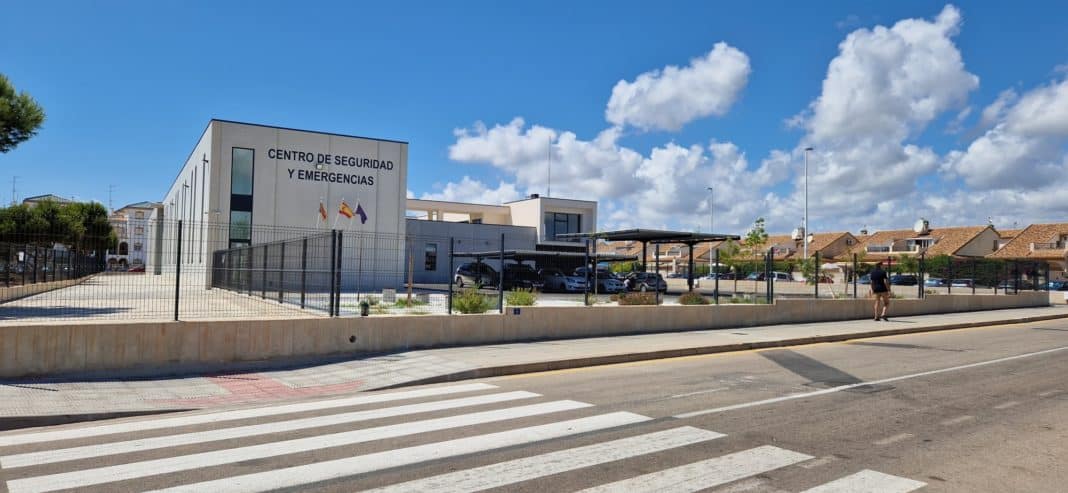More than three months after the opening of the 2 million euro Orihuela Costa Emergency centre, much lauded during a visit at the end of May by the mayor, Carolina Gracia, the deputy mayor, José Aix, and several Orihuela councillors, the building is already being called a ‘white elephant’ as, during the height of the summer season, when it’s promised services were most in demand, the facilities continue to operate at half throttle, in what community groups are already calling a sham.
A 4,700-square-metre building, currently with more offices than staff, only houses the Immigration Office of the National Police, to process NIE’s (Foreigner Identity Documents), and the Local Police, who keep it operational 24 hours a day, both of which were previously accommodated in the Playa Flamenca Town Hall.
Three months ago the public were told that only a few small details remained, signage, minor furnishings and so forth, as it’s doors were thrown open during a visit by the mayor, Carolina Gracia, and her entourage.
Even at that stage, she said that it was “an opportunity” to formally ask the Consell to expand it’s services, incorporating new procedures that “due to lack of space, or for other reasons, could not previously be provided” but that could now be transferred into to these new facilities.
It had already been confirmed that the Civil Guard would move in, reintroducing a service that had been suspended in the Town Hall during the pandemic and yet to be replaced, thereby avoiding the 10 kilometre trips to the Torre de la Horadada barracks in order to report crime or file complaints.
Antonio Sánchez, Councillor Security, said they are being prevented from making the move because of a computer problem; that is to say, the necessary logistics do not exist in the Emergency centre for the office to operate securely, something that the Civil Guard itself must solve with the installation of its private network. Other sources, however, point to a lack of officers.
At the moment, there is no date for the start of activities by the Benemérita in the brand new centre, a concrete giant that operates as a near-empty shell.
To get an idea of the magnitude, the underground basement has 50 parking spaces, three cells and a fully equipped gymnasium for agents. On the ground floor, for customer services, are the offices, changing rooms, restrooms and a dining room, while at the rear of the plot is a heliport.
The facility was designed to accommodate Firefighters, Civil Protection and forestry brigades, who would be able to coordinate actions in the southern area of Alicante, and even a SAMU base in summer. It was also designed to act as a communications hub, where emergency and none emergency calls could be routed to the relevant bodies for a smoother and faster response.
The fire service has already been ruled out, despite the claim by neighborhood organisations that response times would improve as, in most cases, it is the Torrevieja detachment that travels to the Orihuela Costa.
The Consell project, which began in 2010, was paralysed by the builder’s bankruptcy in 2012. How much money was lost during that episode is unclear? It was then taken up again in 2020 by the Orihuela government who awarded the work to the Doalco company for more than 2 million euros, financed by the Generalitat. However, the completion of the first floor, which remains as little more than a building site, still requires a further investment of at least 600,000 euros.
The Emergency Centre continues to be a facility that is much in demand by residents of Orihuela Costa, many of whom, during the intervening years, have attended numerous protests and demonstrations in front of the skeleton of the building, in demand of a centre that they consider will significantly improve security in this highly populated area, especially in summer, by providing better response times to emergencies and public services. Orihuela Costa has a stable census of 30,000 people that triples with the arrival of holidaymakers during the summer.
Meanwhile, members of the Cabo Roig and Lomas Neighborhood Association, in a recent meeting with the chief of the Local Police, José María Pomares, have requested that police control and the number of agents be increased.
There are currently about 41 officers assigned to Orihuela Costa, where they operate two night patrols, both on the beaches and in the surveillance of illegal dumping of pruning, debris and belongings. Officers are able to call on the use of drones and even surveillance cameras, a measure that is still being studied. They can also be required to supplement the maritime patrol to maintain order in the areas close to the marinas and bathing areas so quite clearly the number of officers currently allocated is not enough.





